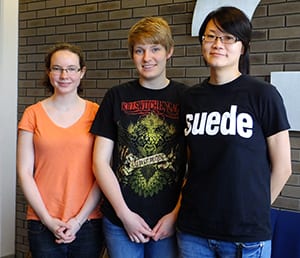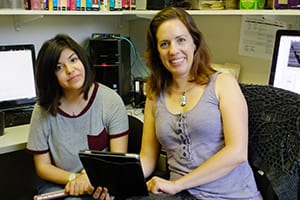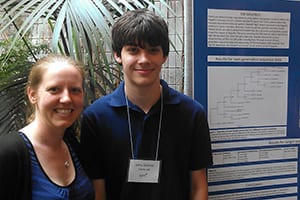News
The Perks of Being a Mentor
Summer internships at BTI let students try on the life of a scientist for a few months, while attending a variety of talks, trainings and social events. But what’s in it for the mentors, who painstakingly train them?
For most of the graduate students, technicians and postdocs who supervise BTI interns, the responsibility is a labor of love. They answer questions, teach basic laboratory skills and oversee the ups and downs of student projects.
“If you’re going to do it properly, I think it’s very time demanding,” said Miguel Pineros, a U.S. Department of Agriculture research scientist at the Robert W. Holley Center in Ithaca. “You can expect that half of your summer is just going to go ‘phthhtt’ research-wise, but it’s totally worth it.”
Undoubtedly, the students get a comprehensive research experience, said Shih-Chi Hsu, a postdoctoral researcher in the Stern laboratory, who has mentored a variety of college students during her research career. Hsu is engineering a fast-growing species of algae to produce hydrocarbons, for use in biofuels. “It’s a great experience. You can sample what science is like in a lab, hear a lot of interesting talks and do reports and presentations—the whole package.”

BTI summer interns Colleen McLoughlin, Kerrin Mendler, and Shih-chi Hsu, Postdoctoral scientist in Stern Lab
Anyone who has overseen an intern project has stories of fizzled chemical reactions, fried plants from overheated incubators, or crashed computers running the wrong bioinformatics program. But with time and patience, the students master new techniques and generate real results for the laboratory. BTI interns sometimes get their name on scientific articles published by the laboratory.
Though everyone appreciates having an extra set of hands around, more importantly, the mentors enjoy sharing the work they love and training a new generation of people interested in science.
Pineros has mentored three students from BTI programs in his research laboratory, which uses electrophysiology to study how plants take up nutrients from the soil. He finds that the hardest part of being a mentor is holding back from helping the students too much.
“It’s tough sometimes thinking, ‘I know you’re going to mess up, but go ahead,’” he said. The intern’s project will ultimately become part of the laboratory’s research, so it can be difficult to strike a balance between letting the students make mistakes that they’ll learn from, and ensuring that they have a successful project. “You want to trust what they’re doing, but guide them as little as possible,” he said.

BTI summer bioinformatics intern Ivana Rodriguez and mentor Suzy Strickler, Research Associate in Mueller Lab
Susan Strickler, a bioinformatics consultant and research associate in the laboratory of Lukas Mueller who collaborates on a variety of genome projects, finds that she can give her interns more freedom because it’s easier to correct mistakes made on a computer. “You just delete what you don’t want,” she said.
Though interns, mentors and faculty alike all want the student to complete the summer with a viable project, sometimes the flops can be even more educational than the successes. Sarah Hind, a postdoctoral researcher in Professor Greg Martin’s laboratory at BTI, studies the interactions between tomato plants and bacteria that causes speck disease, and points out that learning to troubleshoot unsuccessful experiments is a valuable research skill.
“I think it’s important to learn that just because an experiment didn’t work, it doesn’t mean that it’s a failure. I think the earlier that they learn that, the better,” said Hind. Successful results can be elusive in science, and students who can’t handle setbacks may wish to consider another career.
Hsu echoes this sentiment.
“I hope they understand what research is really about. In the textbook, everything seems very simple and straightforward,” said Hsu. “But when you’re doing research, it’s actually trial and error and walking in the dark and touching the wall to find where the opening is. I think afterwards they do understand that maybe you do 10 experiments and only one result will matter. And sometimes it’s not even clear what that result means.”
For students who are hoping to jumpstart a career based on these internships, Strickler recommends that it’s really important to understand their interests. “If they’re going to be basing a career off of this, I think its really important to take these two to three months to see if they really like it and if it’s a good fit for them,” she said.
Even the most intelligent and capable scientists aren’t cut out for all laboratory tasks. “I spent six years in grad school doing bench work and I was terrible at that,” laughs Strickler.
BTI mentors also get to share their own experiences in science. They serve as career counselors of sorts, advising interns on the realities of graduate school and the plant science job market. Ideally, their advice will help students to suss out the best path; whether graduate school is the right step for them and if they’re cut out for fundamental plant research.
“I think many students jump into grad school because it’s the obvious next step, but they don’t realize the implications of it,” said Pineros. “The questions behind it are very exciting but the day to day can be very boring. I think that’s something they realize once they start doing the work.”
Pineros finds that despite doing excellent research in his laboratory, some of his students realize that they might prefer doing more applied research, such as ecology, during the course of the internship.
If interns do continue on in plant science, then they are already building relationships with their future colleagues. But if not, interns still liven up a laboratory. Pineros had a student who brought in his own homemade energy bars; Hind took one intern out for bar trivia on her 21st birthday; Strickler has received thank you cards that still adorn her office walls.
And supervising an intern can also help the mentor to develop new skills.
“I do think I get something out of it because in the future I want to be a Principle Investigator and I will be working with very different types of students, in a classroom setting and in a lab,” said Hind. “Each student has their own challenges and part of being a good mentor is identifying what those challenges are and trying to address them so that you can help them grow,” she said.
Pineros thinks that mentoring gives him an opportunity to practice his science communication skills, and to share his work with non- scientists—an important part of the job. “It’s an exercise for me as well, to be able to put what I do so simply that an undergrad can understand and be thrilled about it,” said Pineros.
And finally, there’s the personal satisfaction of helping someone along a chosen career path. About 80 percent of BTI interns go on to pursue advanced degrees in STEM fields, with recent interns attending graduate or medical school or entering jobs in research and STEM education.
“It’s just rewarding to see where they go and see their next step,” said Strickler, “and know that I had my own little tiny part in helping them along in their journey.”



